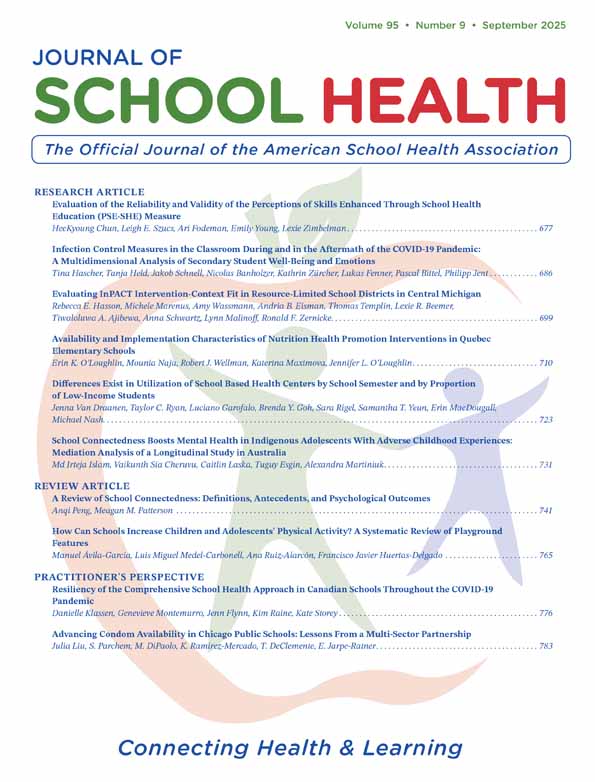School Climate: Psychological Health and Well-Being in School
Edward W. Schultz
Edward W. Schultz, PhD, Interim Dean of Education; Raymond M. Glass, PhD, Associate Director, Professional Development; and J. Dennis Kamholtz, PhD, Associate Professor, Health Education, University of Maine at Farmington, 86 Main Ave., Farmington, ME 04930.
Search for more papers by this authorRaymond M. Glass
Edward W. Schultz, PhD, Interim Dean of Education; Raymond M. Glass, PhD, Associate Director, Professional Development; and J. Dennis Kamholtz, PhD, Associate Professor, Health Education, University of Maine at Farmington, 86 Main Ave., Farmington, ME 04930.
Search for more papers by this authorJ. Dennis Kamholtz
Edward W. Schultz, PhD, Interim Dean of Education; Raymond M. Glass, PhD, Associate Director, Professional Development; and J. Dennis Kamholtz, PhD, Associate Professor, Health Education, University of Maine at Farmington, 86 Main Ave., Farmington, ME 04930.
Search for more papers by this authorEdward W. Schultz
Edward W. Schultz, PhD, Interim Dean of Education; Raymond M. Glass, PhD, Associate Director, Professional Development; and J. Dennis Kamholtz, PhD, Associate Professor, Health Education, University of Maine at Farmington, 86 Main Ave., Farmington, ME 04930.
Search for more papers by this authorRaymond M. Glass
Edward W. Schultz, PhD, Interim Dean of Education; Raymond M. Glass, PhD, Associate Director, Professional Development; and J. Dennis Kamholtz, PhD, Associate Professor, Health Education, University of Maine at Farmington, 86 Main Ave., Farmington, ME 04930.
Search for more papers by this authorJ. Dennis Kamholtz
Edward W. Schultz, PhD, Interim Dean of Education; Raymond M. Glass, PhD, Associate Director, Professional Development; and J. Dennis Kamholtz, PhD, Associate Professor, Health Education, University of Maine at Farmington, 86 Main Ave., Farmington, ME 04930.
Search for more papers by this authorAbstract
ABSTRACT: This article explores several aspects of a healthy school climate. Beginning with a general discussion, it also examines elements of school climate such as interpersonal relationships and supportive instructional practices. A discussion of the school as a human social system that lends itself to a problem-solving approach to identify, explore, and resolve issues of psychological climate in school is included.
References
- 1 Selye H.: The Stress of Life. New York, McGraw-Hill Book Company, 1956.
- 2 Maslow A.: Towards psychology of being, in VF Jones, LS Jones: Comprehensive Classroom Management, 2nd ed. Boston, Allyn & Bacon, 1986, p 31.
- 3 Cummings EE: A poet's advice to students, in DP Elkins (ed): Glad to Be Me. Englewood Cliffs, NJ, Prentice-Hall, 1976, p 48.
- 4 Blom GE, Cheney D., Snoddy JE: Stress in Childhood: An introduction model for teachers and other professionals. New York, Teachers College Press, 1986.
- 5 Roger CR: On Personal Power. New York, Delacort Press, 1977.
- 6 Schultz EW, Heuchert CM: Child Stress and the School Experience. New York, Human Sciences Press, 1983.
- 7 Park CC: The Siege: The first eight years with an autistic child. Boston, Little, Brown & Co, 1972, p 94.
- 8 Brammer J.: The Helping Relationship, 3rd ed. Englewood Cliffs, NJ, Prentice-Hall, 1985.
- 9 Moustakas C.: The Authentic Teacher. Cambridge, Mass, Howard A. Doyle Publishing, 1972, p 31.
- 10 Johnson D., Johnson R., Nelson D., Skon L.: Effects of cooperative, competitive, and individualistic goal structures on achievement: A metaanalysis. Psychol Bull 1981; 89: 47–62.
- 11
Johnson D.,
Johnson R.: Effects of cooperative, competitive, and individualistic learning experiences on cross-ethnic interaction and friendships.
J Soc Psychol
1982; 18: 47–58.
10.1080/00224545.1982.9924417 Google Scholar
- 12 McGinnis E., Goldstein A.: Skillstreaming the Elementary School Child. Champaign, Ill, Research Press, 1984.
- 13 Jackson N., Jackson D., Monroe C.: Getting Along with Others. Champaign, Ill, Research Press, 1983.
- 14 Goldstein A., Glick B.: Aggression Replacement Training. Champaign, Ill, Research Press, 1987.
- 15 Rosenshine B., Stevens R.: Teaching functions, in M. Whitrock (ed): Handbook of Research on Teaching, 3rd ed. New York, Macmillan, 1986.
- 16 Gallup G.: The 16th annual Gallup poll on the public's attitudes toward the public schools. Phi Delta Kappan, 1984;September: 23–28.
- 17 Canter L., Canter M.: Assertive Discipline: A take charge approach for today's educators. Seal Beach, Calif, Canter Associates, 1976.
- 18 Wolfgang C., Glickman C.: Solving Discipline Problems. Boston, Allyn & Bacon, Inc, 1986.
- 19 Glasser W.: Reality Therapy: A new approach to psychiatry. New York, Harper & Row, 1975.
- 20 Glasser W.: Control Therapy in the Classroom. New York, Perennial Library, 1986.
- 21 Purkey WW, Novak JM: Inviting School Success, 2nd ed, Belmont, Calif, Wadsworth Publishing, 1984.
- 22 Satir V.: Peoplemaking. Palo Alto, Calif, Science and Behavior Books, 1972, p 12.
- 23 Passuate D., Tritsch L., Slater S.: Seaside Health Education Conference. Eta Sigma Gamman 1981;Spring/Summer: 28–30.
- 24 Connell D., Turner RR, Mason EF: Summary of the findings of the school health education evaluation. J Sch Health 1985; 55(8): 316–321.
- 25 National Task Force on the Preparation and Practices of Health Educators: A Guide for the Development of Competency Based Curricula for Entry-Level Health Educators. New York, National Task Force on the Preparation and Practices of Health Educators, 1983.
- 26 Hollister WG: The concept of stress in education: A challenge to curriculum development, in EM Bower, WG Hollister (eds): Behavioral Science Frontiers in Education. New York, John Wiley & Sons, 1967.




